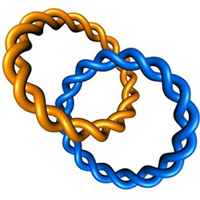NSF CAREER grant helps mathematician unravel DNA puzzle
Sept. 20, 2011 -- Associate Professor of Mathematics Mariel Vazquez studies the entanglement of DNA as it packs tightly into living cells. She has received a prestigious National Science Foundation CAREER Award for her research, which applies pure math to the biological mysteries of DNA.

Mariel Vazquez, associate professor of mathematics
Born and raised in Mexico City, Vazquez became fascinated with math and biology in high school. "I found pure mathematics to be absolutely beautiful but I didn't know how I could apply it to biology," Vazquez said. That changed when she became an undergraduate at the National Autonomous University of Mexico and attended a series of talks about DNA topology -- the application of knot theory to the study of DNA.
Vazquez went on to specialize in DNA topology, earning a Ph.D. at Florida State University under the supervision of De Witt Sumners, one of the seminal researchers in this emerging field. She spent five years as a postdoctoral researcher and visiting assistant professor at University of California, Berkeley, before joining SF State in 2005.
"When DNA is packed into a cell it doesn't look like the straight double helix that we see in textbooks pictures," Vazquez said. "In order to fit into the cell, the double helix is twisted and coiled around itself and around proteins."
One of nature's problems is that the two strands of the DNA's double helix must be separated and unwound in order to be copied, allowing the genome to replicate. Scientists have found enzymes which disentangle DNA, allowing it to replicate, but much is still to be learned about how they work.
These enzymes are vital for the functioning of healthy cells in all living organisms. They also play an important role in allowing bacteria and other malignant cells to multiply, making them targets for antibiotics and anti-cancer drugs.

Representation of two circular DNA molecules, like those found in bacterial DNA, which become interlinked after DNA replication. Vazquez studies how an enzyme unlinks the two DNA molecules.
In bacterial DNA, the double helix is bent around and joined in a circle. When the DNA replicates, it produces two interlocked circular DNA molecules -- like two links in a paper chain -- that can't be separated without the help of an enzyme.
Vazquez and her colleagues at Oxford University are studying the action of an enzyme that disentangles DNA in the bacterium Escherichia coli (E. coli). "We'll use mathematics to study the enzymatic mechanism and computer simulations to determine the most probable pathways of disentanglement," Vazquez said.
The CAREER grant of nearly $600,000 awarded to Vazquez will help her develop international partnerships with mathematicians, biologists and computer scientists to investigate how these enzymes work. The National Science Foundation's CAREER grant is awarded to faculty early in their careers who are conducting innovative research and finding creative ways to integrate research and education.
Vazquez is planning educational activities on DNA topology for the general public at the California Academy of Sciences. She will also introduce her work to local elementary school children by writing and delivering curriculum at one of SF State's Math Circles.
Vazquez says people are often surprised when they hear that she teaches DNA topology not only to college students but also to 6-year-olds. "I can do it, I know that it works," said Vazquez, who has run a math club for first- and second-grade children over the last year. "I used ropes, ribbons, glue, bubbles and computers to teach them about knot theory, and the children loved it," she said.
Vazquez is the latest SF State faculty member to receive a CAREER grant. Currently nine SF State faculty have active CAREER grants, including Federico Ardila, Yitwah Cheung, Diana Chu, Kimberly Tanner, Mary Leech, Rahul Singh, Teaster Baird Jr., and Andrew Ichimura.
Vazquez discusses her research on DNA topology in this video interview.
-- Elaine Bible
Share this story:
